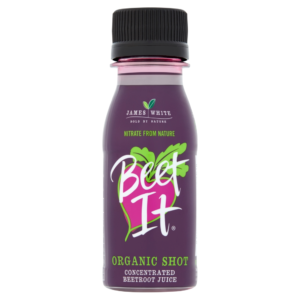Many people struggle to sleep well at night. Some sleep so poorly that it reduces the quality of their everyday life and leads to the development of a number of illnesses. COPD patients in particular have sleep disorders and there is a need to identify and research natural substances that have the potential to improve sleep in this group.
Dr Harald Engan coordinated the research at the Norwegian Lung and Heart Hospital at Gardermoen, University of Bergen (Norway), the Karolinska Institute (Sweden), Washington State University (USA) and Unicare Norway.
Deeper and longer sleep
The results from the study show that when COPD patients drank concentrated beetroot juice at bedtime, their overnight sleep quality improved and the duration of deep sleep episodes was increased.
Electrical impulses measured in the brain showed signs of increased sleep depth and the oxygen level in the blood was higher during parts of the night when patients consumed the concentrated beetroot juice.
Nitrate is the active substance
It is the high content of nitrate in the beetroot that is the key to better sleep. After consuming, this is converted to Nitric Oxide in the blood system. Nitric Oxide is essential for a number of physiological processes that take place in the body. Many previous studies have shown that Nitric Oxide has contributes to increased levels of oxygen in the blood and improved distribution of oxygen to body tissues.
“I have participated in multi-national research projects that showed that consuming concentrated beetroot juice both improves the function of blood vessels in mountain hikers during altitude stays in The Himalayas, and led to freedivers to utilize the oxygen in the blood better so that they can hold their breath longer,” says Harald Engan. “These experiments, as well as other beetroot juice studies, inspired us to investigate whether this natural and healthy vegetable juice can help patient groups who are in rehabilitation.”
This is the first study to investigate the effects of concentrated beetroot juice on sleep, and more studies will be needed to enable us to fully understand the mechanisms behind our results. It has demonstrated a previously unknown connection between the consumption of a natural vegetable product and sleep quality. It will be exciting to investigate whether this can help others who are struggling with sleep problems.
The study was a double-blinded, randomized, placebo-controlled study. Just before bedtime, patients were given a single shot of concentrated beetroot juice with nitrate one night and without nitrate another night. While the patients slept, they were connected to measuring equipment that records electrical impulses in the brain, oxygen saturation in the blood and other sleep data that are well established in sleep research.
The study was funded by The Norwegian National Competence Center for Sleep Disorders (SOVNO) in Norway, Norwegian Centre of Excellence in Home Mechanical Ventilation, Unicare Norway and The Norwegian Heart and Lung Association.
Dr Harald Engan is head of research and development at Unicare Norway, a rehabilitation and approved research institution in Norway.
The study used Beet It (concentrated beetroot juice) shots with 400mg natural nitrate content and nitrate depleted Beet It shots manufactured by James White Drinks (UK) as placebo.


You must be logged in to post a comment Login